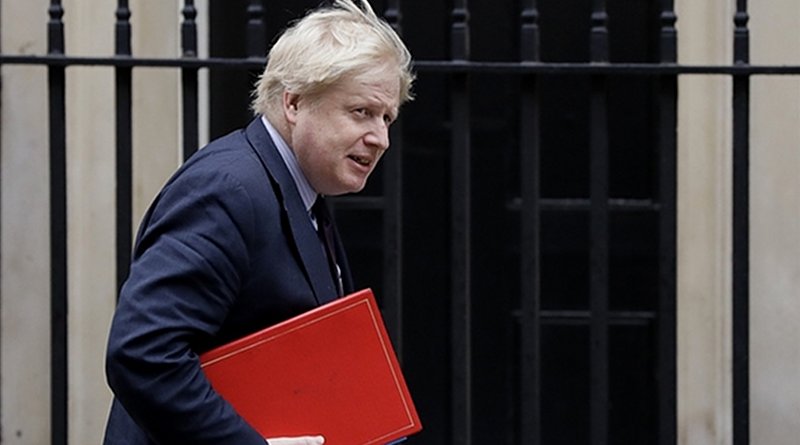Johnson Doubles Down As Brexit Deadline Approaches – OpEd
By Arab News
By Andrew Hammond*
British Prime Minister Boris Johnson is preparing for what could be a make-or-break Brexit meeting with EU leaders as soon as next week. A breakthrough remains possible but, with deadlines closing in, there is a growing likelihood of a hard, potentially disorderly end to the transition period with no UK-EU trade deal.
The reason why the anticipated meeting between Johnson, European Commission President Ursula von der Leyen and the European Council President Charles Michel is so critical is that no major progress has been made in talks this year. The latest round, which finished last Friday, also hit the buffers.
EU chief negotiator Michel Barnier last month accused the UK of continuing to backtrack on the commitments it made last year, including pledges to achieve a close economic partnership and to cooperate on security and policing. He asserted that the negotiating teams are still very far from reaching agreement on a range of key issues, including the so-called level playing fields rules, nuclear safety, and anti-money laundering and counterterrorism funding. This negative assessment is shared by the UK’s lead negotiator, David Frost.
With talks at an impasse, the Johnson-Von der Leyen-Michel session — expected before the next European Council summit on June 19 — could be critical in charting a way forward. If something can be agreed, a deal could yet be hammered out during the German presidency of the European Council, which starts on July 1.
However, there is a significant and growing chance of a no-deal exit at the end of the year and Johnson is playing increasingly high-stakes poker as he doubles down with his brinkmanship. It is not just the fact that time is now running short to conclude a deal, but that the EU has never concluded a trade agreement this quickly.
If a deal cannot be reached and the transition period is not extended, trading with the EU on World Trade Organization terms (what the UK government calls an “Australia-style” agreement) could have serious economic repercussions. This is especially so given that, amid the coronavirus pandemic, there are significant concerns about business readiness for that no-deal scenario, which many Brexiteers said would never materialize.
Failure to extend the transition period could also have major non-economic challenges too, as the UK’s new post-Brexit immigration system may not be up and running by the end of the year. And, although there has been some progress on meeting the UK’s commitments under the Northern Ireland Protocol, there remains a lot to be clarified and businesses will struggle to be ready.
Johnson’s high-risk approach to Brexit is, in several respects, a continuation of his style from last year that saw, for instance, his gamble of proroguing Parliament overruled by the Supreme Court. However, this approach, which has seen Johnson place a remarkable series of big political bets in his first year in office, goes well beyond relations with the EU.
Take the example of Johnson’s push for a pre-Christmas general election — the first December ballot for a century, and at a time of extraordinary political volatility. There was also his early outlier approach to tackling the coronavirus outbreak, which didn’t deliver the results intended, forcing him to introduce tighter lockdown restrictions in the second half of March.
Johnson’s original pandemic strategy was out of kilter with countries such as South Korea and China, which imposed restrictive measures much faster.
Fast forward several months and it is clear that South Korea and China have fared better, with the UK now having the second-highest number of deaths in the world after the US. A growing number of UK officials assert that the lockdown should have been introduced sooner.
Coronavirus aside, Johnson’s gambles have so far generally paid off, including his big general election win in December. However, a no-deal Brexit could come back to haunt the prime minister in 2021, especially if it prolongs the UK’s pandemic recession.
If a hard, potentially disorderly exit occurs, both Brussels and London would almost certainly need to return to the negotiating table in the months that follow, but with a new set of incentives. Such discussions could take significantly longer in this scenario than if Johnson were to secure a deal during the transition period.
Moreover, outside of the transition, the negotiating process could get significantly harder, with the same tough trade-offs as before. One factor that may make concluding a deal significantly more difficult is that — outside of the transition process that requires only a qualified majority of states to ratify any agreement — EU-27 unanimity would be needed. Indeed, the possibility of just one European state blocking an agreement remains a key risk for both Brussels and London.
Johnson is, therefore, taking a major punt with his Brexit strategy. If he refuses to extend the transition period, there is a growing likelihood of a no-deal exit, with the window for businesses and government to prepare for such a potentially disorderly outcome shrinking by the day.
- Andrew Hammond is an Associate at LSE IDEAS at the London School of Economics.

